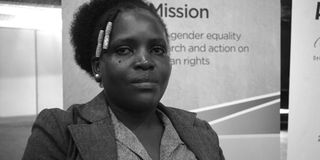Woman living with disability sterilised without her consent

What you need to know:
- Akumu successfully delivered her third baby through Caesarean section
- Doctor sterilised her due to her physical challenge
- Her husband took off because he wanted a son
June 3, 2007, will forever be etched in Prisca Akumu’s heart. On this day, she walked into a referral hospital in Nairobi with stinging labour pains.
She was booked in for delivery, but the doctors said “her pregnancy was an emergency case.’
She successfully delivered her baby through Caesarean section (CS). But something was amiss.
Ms Akumu, now a mother of three, experienced excruciating pain on her left side of the stomach three days post-surgery. To her, it was uncommon.
She only experienced pain on the front side of the stomach with her first and second child, both of whom she delivered through CS.
“On the third day, I asked the doctor who was assessing my recovery why I was in so much pain that I could not even lie or turn on my left,” says Ms Akumu, fighting back tears.
“He looked at my file and told me I had undergone TL (tubal ligation). I asked him ‘what is TL?’ since I had no idea what it is,” she says.
“I was shocked when he explained to me what it meant. I did not sign anywhere to give consent for TL,” she says.
FALLOPIAN TUBES
Tubal ligation is a surgical procedure for female sterilisation in which the fallopian tubes are permanently blocked or removed.
Ms Akumu is different. She has a physical disability. Her left leg is deformed, so she walks with a limp.
The doctor’s response to her inquiry on why they tied her tubes without her permission was even more shocking.
“He said they decided to do so because I live with disability, and had already given birth to three children through CS,” she says.
“I wondered ‘why would they not inform me before they did that?’ ‘Who told them I did not want any more children?” Ms Akumu says, with bitterness written all over her face.
“It is a painful reality that I have not managed to cope with,” she adds, “I have not forgiven that doctor for taking away my right to have more children. I would have wished to give birth to a son.
WANTED A SON
She was happy to have three girls, but knew her husband wanted a son, and so the idea of tying her tubes would not have crossed her mind even if she was offered the option.
Telling her husband that conceiving was a mirage going forward, was a secret she struggled to let out. She knew her husband longed to have a son.
The reality was to hit hard on her three years later when he asked to have another child, this time, hoping for a boy.
She, however, failed to conceive despite the many trials. Then, in 2010 he left and married another woman with whom he has two sons.
WOMEN'S RIGHTS
“I do not want any other woman to experience my pain. It is tortuous. I want everyone to respect the rights of the women regardless of their status,” she says.
Ms Akumu is the highlight of the ongoing 9th Africa Conference on Sexual Health and Rights (ACSHR) at Kenyatta International Convention Centre (KICC).
Discussions on how to help women and girls in the slums enjoy their sexual and reproductive health and rights, have been given prominence as African governments have been blamed of neglecting this population.
According to Dr Uwemedimo Uko Esiet, a Nigerian family planning expert and convener of the conference, without addressing the SRHR of women and girls in the slums, Africa cannot claim to have achieved any development.
“Have we undervalued our girls and women? Are we really doing enough to provide for their sexual and reproductive health and rights and or are we just making commitments after commitments?” he wonders.





